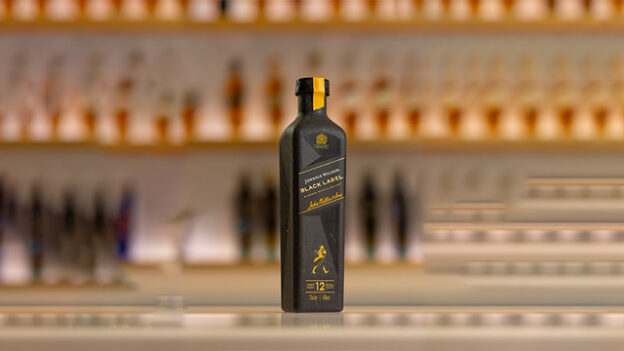- first-of-its-kind 90% paper-based bottle for Johnnie Walker Black Label
- Running exclusively at Johnnie Walker Princes Street’s 1820 bar, in Edinburgh
The makers of Guinness, Don Julio Tequila and Smirnoff Vodka has launched on a trial basis the first-of-its-kind 90% paper-based bottle for Johnnie Walker Black Label exclusively at Johnnie Walker Princes Street’s 1820 bar, in Edinburgh.
Created in partnership with PA Consulting, as part of the Bottle Collective with PA and PulPac, this is Diageo’s first paper-based 70cl bottle trial in the on-trade. The trial began on September 25th of this year and is expected to assess how bartenders interact with and pour from the bottle, and how the bottle fares in a bar environment. A total of 250 paper-based bottles are being for the trial period which is expected to run until mid-October 2024.
Diageo said that members of the public will be able to see the bottles in use behind the bar, however they cannot purchase the bottle. This will be the second paper-based bottle trial from Diageo and PA, following the success of the Baileys paper-based bottle mini format (80ml) trial, using a similar Dry Molded Fiber innovation at the Time Out Festival in Barcelona earlier this year.
Diageo said that the design team had taken learnings from the technical aspects of the miniature format, to make a larger and more complex shape for Johnnie Walker. The bottle’s design retains the iconic square shape of Johnnie Walker Black Label, whilst enhancing the premium appeal with unique facets cut into the sides of the bottle and embossing of the Striding Man on the bottle and closure.
Paper Bottle is about 60% lighter
The trial bottle is made from 90% paper and a very thin plastic liner. The innovative technology makes the paper-based bottle approximately 60% lighter, with initial external life cycle analysis on the prototype showing an up to 47% potential reduction in carbon emissions compared to the Johnnie Walker Black Label glass bottle equivalent. The bottle closure was developed in collaboration with PulPac, Setop DIAM and PA and is made from a unique combination of cork and similar Dry Molded Fiber paper technology as the bottle. It is only intended for use during the trial and excluded from calculations.
The Johnnie Walker Black Label paper-based bottle for this test is designed considering recyclability among other aspects. The plastic liner is designed to not require consumer or bartender disassembly, as it is not attached or bonded to the outer paper layer, assisting recycling facilities to separate without disrupting the recycling process. The stopper used for trial purposes is not recyclable, however alternative solutions are in development. Throughout the trial and further development of the paper-based bottle, the recycling capability will be a key factor for future versions of the bottle as we continue to test, learn and develop.
Jamie Stone, Design and Innovation Expert at PA Consulting, adds: “These bottles break new ground in packaging design and shows the potential to significantly reduce carbon emissions.”
Beyond paper-based solutions, the brand recently introduced Johnnie Walker Blue Label Ultra, the word’s lightest whisky glass bottle, weighing just 180g without the stopper. The design featured a unique teardrop shape, lattice stopper, and bamboo frame to bring luxury and simplicity together. While Johnnie Walker Blue Label Ultra is a design experiment, the insights gained will guide future glass light-weighting initiatives across the Diageo portfolio.
These latest innovations form part of Diageo’s ambition to reduce its carbon footprint by exploring new packaging formats, including the launch of a 70cl aluminum spirits bottle with Baileys, a global licensing agreement with circular economy technology company ecoSPIRITS, and removing the cardboard gift boxes in its premium Scotch portfolio to reduce excess packaging.

